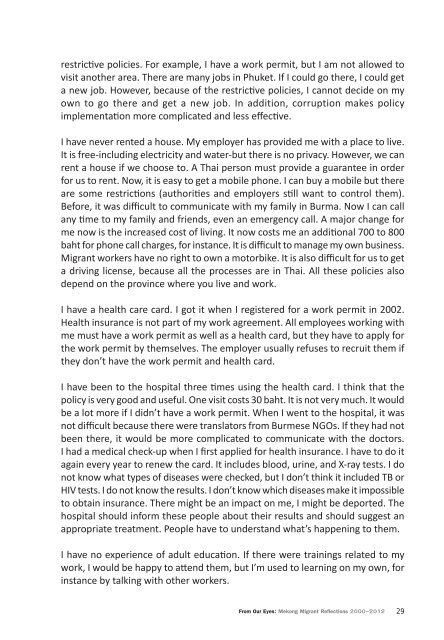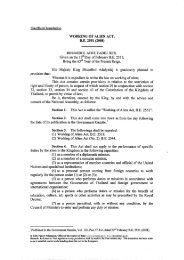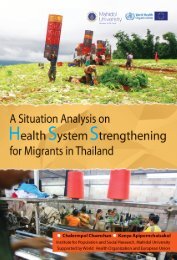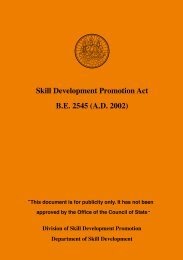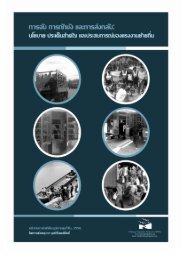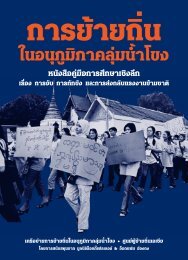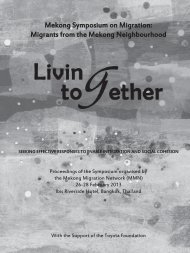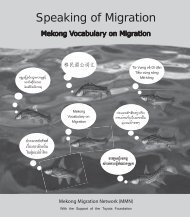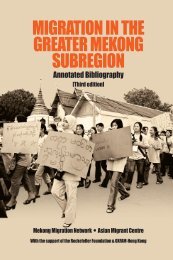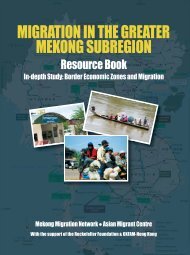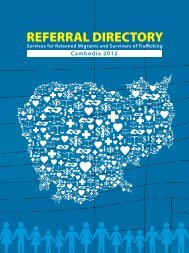From Our Eyes: Mekong Migrant Reflections 2000 - MAP Foundation
From Our Eyes: Mekong Migrant Reflections 2000 - MAP Foundation
From Our Eyes: Mekong Migrant Reflections 2000 - MAP Foundation
Create successful ePaper yourself
Turn your PDF publications into a flip-book with our unique Google optimized e-Paper software.
estricve policies. For example, I have a work permit, but I am not allowed to<br />
visit another area. There are many jobs in Phuket. If I could go there, I could get<br />
a new job. However, because of the restricve policies, I cannot decide on my<br />
own to go there and get a new job. In addition, corruption makes policy<br />
implementaon more complicated and less effecve.<br />
I have never rented a house. My employer has provided me with a place to live.<br />
It is free-including electricity and water-but there is no privacy. However, we can<br />
rent a house if we choose to. A Thai person must provide a guarantee in order<br />
for us to rent. Now, it is easy to get a mobile phone. I can buy a mobile but there<br />
are some restricons (authories and employers sll want to control them).<br />
Before, it was difficult to communicate with my family in Burma. Now I can call<br />
any me to my family and friends, even an emergency call. A major change for<br />
me now is the increased cost of living. It now costs me an addional 700 to 800<br />
baht for phone call charges, for instance. It is difficult to manage my own business.<br />
<strong>Migrant</strong> workers have no right to own a motorbike. It is also difficult for us to get<br />
a driving license, because all the processes are in Thai. All these policies also<br />
depend on the province where you live and work.<br />
I have a health care card. I got it when I registered for a work permit in 2002.<br />
Health insurance is not part of my work agreement. All employees working with<br />
me must have a work permit as well as a health card, but they have to apply for<br />
the work permit by themselves. The employer usually refuses to recruit them if<br />
they don’t have the work permit and health card.<br />
I have been to the hospital three mes using the health card. I think that the<br />
policy is very good and useful. One visit costs 30 baht. It is not very much. It would<br />
be a lot more if I didn’t have a work permit. When I went to the hospital, it was<br />
not difficult because there were translators from Burmese NGOs. If they had not<br />
been there, it would be more complicated to communicate with the doctors.<br />
I had a medical check-up when I first applied for health insurance. I have to do it<br />
again every year to renew the card. It includes blood, urine, and X-ray tests. I do<br />
not know what types of diseases were checked, but I don’t think it included TB or<br />
HIV tests. I do not know the results. I don’t know which diseases make it impossible<br />
to obtain insurance. There might be an impact on me, I might be deported. The<br />
hospital should inform these people about their results and should suggest an<br />
appropriate treatment. People have to understand what’s happening to them.<br />
I have no experience of adult educaon. If there were trainings related to my<br />
work, I would be happy to aend them, but I’m used to learning on my own, for<br />
instance by talking with other workers.<br />
<strong>From</strong> <strong>Our</strong> <strong>Eyes</strong>: <strong>Mekong</strong> <strong>Migrant</strong> <strong>Reflections</strong> <strong>2000</strong>-2012 29


